To the hardcore Jane Austen fans,
50-year-old English actor Colin Firth will always be Mr. Darcy after
he appeared in a wet shirt in the BBC mini-series of Pride and
Prejudice. But he really landed at the top of the hot lists with
his 2009 Best Actor Oscar nomination for playing George in Tom
Ford's A Single Man. Now with a one-two punch, the handsome
actor has hit again with another Tom at the helm, this time
Britisher Tom Hooper, directing Firth in The King's Speech.
The film has already been pulling in nominations or awards from all
over the place including various Golden Globes, SAG Awards and Oscar
noms so far.
This feature provides perfect grist for this seasoned actor's mill
since he has become an expert at playing the kind of male character
that he does so believably one who overcomes self-doubt and rises
to the occasion.
In The King's Speech, Firth plays Bertie, a life-long
stutterer on a quest to find his voice, especially since he suddenly
becomes crowned King George VI of England in 1936. It is based on
the true story of George VI, who faced having to become a public
personality and lead a nation on the brink of World War II, after
years of shunning the spotlight because of his stammer. Once his
father King George V (Michael Gambon) dies, his scandalous brother
Prince Edward VII (Guy Pearce) who was the king-to-be abdicates
the throne in order to marry Wallis Simpson (an American divorcee
with Nazi leanings). England is in desperate need of a leader.
Bertie's wife, Elizabeth (Helena Bonham Carter) the future Queen
Mother had found him an eccentric speech therapist, Lionel Logue
(Geoffrey Rush), who provides an unorthodox treatment and the two
men eventually form an unbreakable bond.
With Logue's support, the King comes to grip with his affliction,
delivers an inspiring radio-address that rallies his people and
unites them in battle against the Axis. Securing the support of his
family, his government, and Winston Churchill (Timothy Spall), the
Royal Monarch succeeds and paves the way for his daughter Elizabeth
to take over upon his unexpected death in 1952.
At a recent roundtable discussion, he talked about his recent
successes, his past career and what makes him such an evocative
actor.
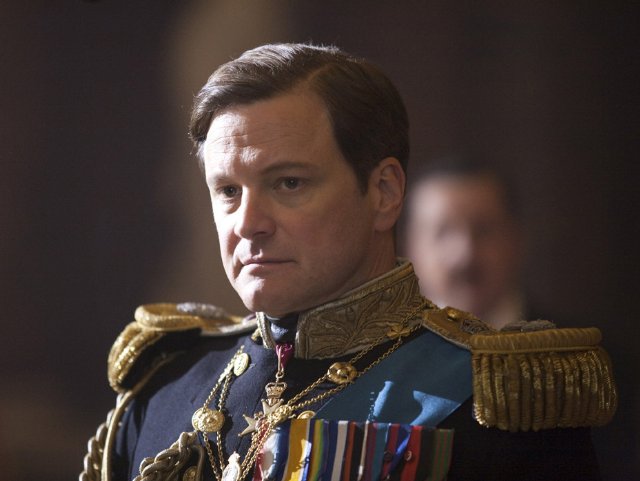 Do we have to bow, Sir Colin?
Do we have to bow, Sir Colin?
Get used to it. Don't bow for me necessarily.
Is that disrespectful to you? [chuckles]
No, no, we do get used to genuflection.
I swear every time we see you, you get younger.
I can give you a phone number.
Growing up British, what was your attitude about the monarchy
before making this movie?
Oh, I don't think my attitude to the monarchy comes into this,
really.
At some point every British child has to have some attitude about
it.
I had attitude generally. Anything that felt like the establishment
or authority was not my friend as a kid. I didn't [have much
interest] about the monarchy. It's just that some people are royal
watchers. Some people love it. Some people feel it's very, very
important to their identity and to what it means to their sense of
nationhood and all that. I'm not one of those people. I'm not that
kind of patriot at all.
Did your attitude change after making this movie?
I don't think so. This film didn't alter any of my political or
social views or anything. I just didn't see it that way. It's about
a man caught in the crossfire of the history of circumstances with
pretty high stakes. I think that the reason why royalty is used for
drama is because of those stakes. If King Lear only had one acre of
land to chop up, you could tell that story. But [if you] just double
the temperature of everything then... you'd probably have a Pinter
play. It heightens things. It's interesting that this seems to be
drawing such universal appeal. All kinds of people are responding.
How? Why? A king that isn't even that well known in history, with a
particular disability which most people don't understand, in 1937,
which most people weren't around for. Why? How does he reach people?
I actually think that [it appeals] on some [primal] level. I'm
trying to figure it out too.
I think that you take normal human obstacles and heighten them. We
all have trouble communicating. We're not perfect communicators. We
don't always have the eloquence we want. We don't always have the
language we want. Sometimes it's much worse than that. If you're
intimidated by somebody, you see that completely. If you're in love
with somebody, you probably see that completely. There are all kinds
of circumstances in which you can't summon the powers to
communicate. We have fears of fulfilling ambitions. We have people
who always feel there's somebody else who throws us into the shadows
or whatever. Whatever those things are, [it is] heightened here.
This is a man whose problems with communication are so very, very
extreme that he's written himself off. Another thing is that it is
not uncommon for people in mid-life to think, "Well, I just never
amounted to enough. I reached this age and if it's not fixed by now,
it never will be." [There are] problems between men and intimacy
notorious, you know. Between anybody, actually, but this happens to
be men and the way they don't want to be revealed as vulnerable.
It's a story about one man trying to reach another through those
barriers we put up. So let's exaggerate those. Make him royal. He
literally lives behind high walls; he has to be [protected]. In
order to be greeted, you have to get through a whole bunch of
titles, and about five names, before you're even allowed to talk to
the guy. He has to hold his hand out first before you get to shake
his hand. So you're building up all these protocols that we hide
behind on a daily basis, but it's heightened by this situation. So I
guess, long winded, but my theory is these are all universal things
which have been beefed up. And being royal is part of that, you
know. It's a human story.
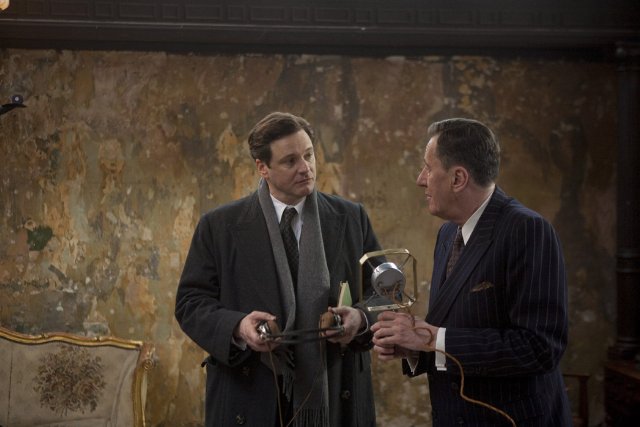 Did you know anything about this story beforehand? How did you
prepare for it?
Did you know anything about this story beforehand? How did you
prepare for it?
I knew nothing about it. I knew that he existed. I knew about the
abdication crisis, but I knew nothing about it. I hadn't even
watched any of the dramas about it. I wasn't even quite sure whether
he was George V or George VI. I remember my mother telling me that
she had great sympathy for him because of the stammer, so I knew
about that. I knew he died relatively young and that the queen came
to the throne very young. We all know that because that was 1952,
and she's still here. I always understood that she was very close to
her father and it must have been very tough to take that job on
while you were still grieving. I had a picture of that as a kid. But
that really was it. I couldn't have told you the date that it all
happened. I never heard when it was broadcast. I don't think I even
knew that our Queen Mother was his wife. It made sense, but, I'm not
a royal watcher. So I was starting from scratch.
Were you surprised to find out about this extraordinary story?
It's interesting to follow what history might pronounce as the minor
characters offstage and see where they go. It reminds me of
Rosencrantz and Guildenstern Are Dead. Tom Hooper would call the
Wallis [Simpson] and Edward VIII story a plot of history. So it
interested me to turn an ostensibly minor character into a
protagonist, realizing they're not that minor at all. Also, I think,
[it reflects] different versions of heroism. I like stories that
reflect on human virtues, not in the superhero realm. It's where we
have to look for qualities that come, perhaps, in a quieter form.
You've taken on difficult roles before and brought life to them
in a way that didn't seem possible.
Thank you for saying that. But I think what is so painful about this
particular character and, in fact, a lot of characters I've taken
on who find communication difficult is that they are people with a
kind of lucidity inside. That's the problem. It wouldn't be a tragic
case if George VI really was dimwitted. I'm not commenting on the
stammer, I'm commenting on the fact that he's been misjudged. If you
read his letters or read his quotes or hear anything he has to say,
this man had an elegance of thought and wit and language. There's no
question about it. He had [a sense of] irony. He was fiercely
intelligent. He did not speak banalities. He had a sense of paradox.
I mean, there's a really fine and subtle mind at work there. And for
that not to come out is immensely painful; to be misjudged as
stupid, which he was, when you have those faculties... I think
that's almost entirely what it's about. And this guy, his mind was
on fire. So I think that tempers, in a way.
This role gets assigned to actors where people think of them as
just playing these characters but they're not as smart as the
director or the screenwriter, but yet there are definitely actors...
Oh, yes, there are some supremely intelligent actors. And I've
worked with a lot of [them], you know. And it's a pity Geoffrey Rush
isn't here to bear that out.
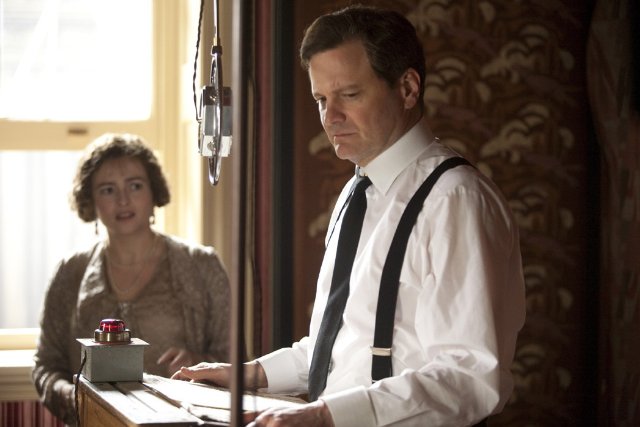 Or Helena [Bonham Carter].
Or Helena [Bonham Carter].
Or Tim Spall. I mean any of the people in our movie. I find it
actually extremely common to meet highly articulate actors. Let's
take a completely different area of public entertainment: talk about
Mamma Mia. It's not highbrow work, but if you've ever
interviewed Meryl Streep or Stellan Skarsgard, you won't hear two
more eloquent people. I think we have to deal with language. We
don't write it. But I think that to grasp it and to own it, you
don't have to be equal to it in the sense that you could have
written it. But you certainly have to have enough gray matter to
navigate it. You can usually tell an actor who's trying to catch up
with words where they're totally out of their depth. You have to be
able to find your way around it whether it's Shakespeare or the
incredibly long sentences that Jane Austen wrote with endless
clauses in the middle, and then trying to find your way halfway down
that paragraph and have it still make sense and find out where you
took a breath on the way. That's a mental exercise.
Speaking of articulate actors, what was it like working with
Helena?
I've known Helena a tiny bit for years and we've actually seen each
other far more recently. But like Jennifer [Ehle, who plays Myrtle
Logue], I love her dearly. She's got a fantastic sense of humor.
She's got the filthiest laugh of anybody that I've ever met. You
would hire her for a table read, I'm telling you. We sat there not
knowing if this film really had any humor in it that was going to
work in the context. I felt there was when I read the script. You
never really know until you put it to the test, and you only need
her there because she just cackled through it all. She has a great
sense of mischief. She's very committed to the job, but she also has
a way of not taking it too seriously, which is a joy to have around.
Most of your scenes with the rest of the cast, including Geoffrey
Rush, are in a stage-like setting. What did you do to get that
chemistry going? Much of it depends on how well you guys act
opposite each other.
We just really started to get to know each other. I mean, I didn't
know him well. We had met 15 years well, not quite [when we did]
Shakespeare in Love. We didn't really work much together on
it, but we did the promotional stuff together the party part of
that. And you know, you do get to know somebody when you're on
junkets and unwinding. Geoff's a lot of fun. I found him such easy
company. He loves ideas. He loves to talk. He loves to go to find
the humor in things. He loves to turn things around in ways that are
interesting. Like Tom Hooper, he's never banal. There's nothing
obvious in his thinking. There's always a fascinating twist. I found
him stimulating company and exhilarating. We spent a lot of time in
each other's company and, because Hooper, as I said, worked every
last hour he possibly could every day of the week, there wasn't a
lot of down time. Sometimes you'd end the day in a state of complete
and utter, almost debilitating, exhaustion. Nobody weeps for the
trials of an actor, but we did feel drained. But we wouldn't go home
because Tom, Geoffrey and I would just talk. We'd go and start to
get our costumes off, begin chatting, and we'd be there until
midnight talking about tomorrow's scene or laughing, and I think
that became an intimacy that helped. We enjoyed the days on set. We
laughed a lot between takes and played with it, you know.
One of the most brilliant scenes in the film was where you cursed
a lot. How did Tom help you to prepare for that scene and how did it
feel to curse so much?
I don't remember what the preparation felt like or what we did. We
did work pretty hard on it. We had to work from how you go from that
because Tom was brilliant at scoring, and what's going to have to
happen before this to make it work really in this scene? What does
David do to you that compresses you so much that this becomes the
only way back out again? You know? And how far can you go? And how
many words is it? And what are those words? And how playful is it?
And how do you get from sitting on a sofa to that? And so that was
one of the few scenes where there had to be a bit of improv.
Are you aware that is the scene that got the film its rating?
Oh, yes.
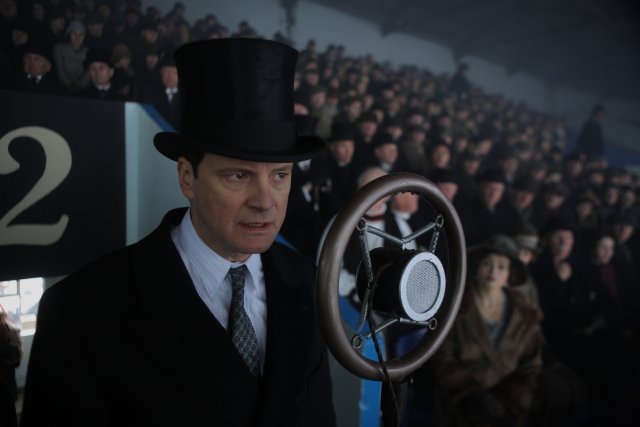 You said you've been surprised about the public response to this
film. At any point during the shooting did you feel that this was
going to be a remarkable film?
You said you've been surprised about the public response to this
film. At any point during the shooting did you feel that this was
going to be a remarkable film?
You never know anything. What made me very optimistic that it would
be like this was the rigor, and Tom Hooper's sheer uncompromising
commitment. In that respect, he reminded me of Tom Ford you know,
that this a person who will not tolerate mediocrity. There's nothing
that's going to get through, not get [scrutinized], for perfection.
I think some people almost wishful think themselves into a result
and that's where you get mediocrity. They get tired, so they say
it's fine. But Hooper will not stop. Tom resents the fact that the
human beings have to sleep, you know. He wishes we could all...
Hooper, Ford or both?
I'm talking about Hooper but I don't know, maybe Tom [Ford]'s like
that too. And I think Tom Hooper wishes Sunday didn't have to
happen, that we didn't have to have families or anything other than
what happens on the set. So a man like that's not going to let a
second rate thing go. I also saw great things happening just
watching Geoffrey Rush, by itself, which made me think we had
something special.
At this moment, there has to be a part of you that says, "I don't
want to jinx what's going on. What am I exactly doing?" Perhaps
employing people who have taken actors that are hot on to that next
level.
Right now I'm not doing anything different at all. I mean, obviously
I would love to find another role that I could just eat up. I'm not
finding it right now. I think I'm doing the best film that's being
made at the moment, which is Tinker, Tailor, Soldier, Spy
[based on John LeCarre's book]. I'm loving being on that set. I
couldn't be in anything better. It's a wonderful role. It's an
ensemble thing. I don't really want to be carrying a film right now.
I think it's nice to leave that to someone else for a moment. It's
Tomas Alfredson [best known for the Swedish vampire film, Let The
Right One In]. It's exhilarating to see what he's doing.
Another Tom?
Another Tom.
Have you hit your stride in your career arc? Last year you had
A Single Man and now The King's Speech being
considered one of the top 10 films of the year?
It's a great moment, but it's too random to call it a stride. If I
keep getting roles as good as this, I would like to think it could
be a stride. But I mean, this is a profession which notoriously
trips you up, you know. And I felt there were moments when I had my
mojo, I just didn't have the scripts. And, you know, I may have
dropped the ball a few times along the way. I'm mixing my metaphors.
But no, this happened to be a time when I was really enjoying the
work. I feel that I'm at an age which is making the stories
interesting. You know, I don't relish the deteriorization process,
but I do find it interesting to play characters where the past
counts, you know. And I've lived long enough to actually have one
now.
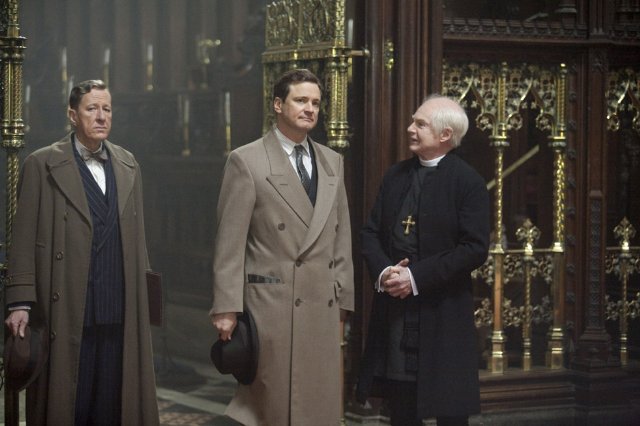 Though you're a consummate communicator, it must have been hard
to figure out how to take a person who has such difficulty with
communicating and communicate it. Do you find in stepping back and
seeing that?
Though you're a consummate communicator, it must have been hard
to figure out how to take a person who has such difficulty with
communicating and communicate it. Do you find in stepping back and
seeing that?
No, I'm not going to take for granted your premise about my ability
to....
In meeting you years ago the days of the Falklands' war film
Tumbledown you were a very serious guy and never seemed
that ambitious. Valmont [which starred Firth and was directed
by Milos Forman] got lost in the shuffle in the wake of the higher
profile Dangerous Liaisons [which was directed by Stephen
Frears and starred John Malkovich both are cinematic renditions of
the French novel Les Liaisons Dangereuses]. You never seemed
to be somebody who really wanted to make it, and now here you are.
Is it a matter of luck when you get there? How did that happen?
It feels like luck. I don't think it can be. I mean I must be doing
something, you know, and I don't just mean acting. I don't know,
it's hard to analyze.
You make choices now, though, that seem to be the right choice.
Oh, that's the lottery. Do you think I didn't always want to get
masterpiece screenplays? You know, if you can't get the masterpiece
then you do what you can to stay in the game. I love working, you
know. I love the collaboration. I love telling stories. There's a
lot of value in light entertainment as well. It can be a joy in
being a part of that. Sometimes I've done movies I wouldn't go and
see. But, you know, I think there was a part of me some of them I
enjoyed immensely. And some of them were, "I hope this keeps me in
the business long enough to get the one I really want to do."
There's that humility about you. Do you understand the humility
of a character because you understand it in yourself?
You should meet the people I have around me. Meet my wife. You'd
understand it if I'm humble. There's no way to get too far above
yourself with her around. I do admire the humility of George VI.
There's something heroic about it in his case. I don't think there
is in mine. There's no chance of me getting above myself with the
people I know. I've tried, believe me.
You're a family man. What do you think about your kids going into
acting? Are they interested?
I think every parent will say exactly the same thing. It's
precarious. It can be bruising. It's a bit of a lottery. It's
painful not to make it. It can even be troublesome if you do make
it. And it's not an easy choice. But, you know, no, I wouldn't push
it. Certainly not push them into it. I would want to expose them to
as many options as possible. That's pretty much what my parents said
to me. But I wouldn't stand in their way.
You have one going in that direction.
My oldest is in drama school now and I'm trying to encourage him.
If King George VI were alive today, what would you ask him?
What do you think of my chances in the awards season? I have decided
to be perverse here.
Email
us Let us know what you
think.